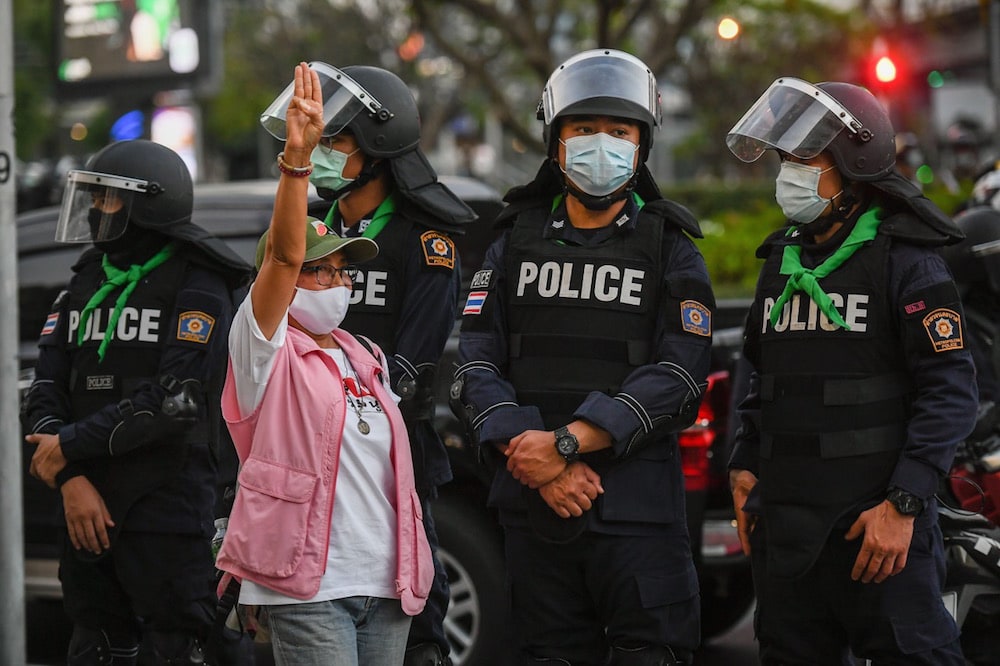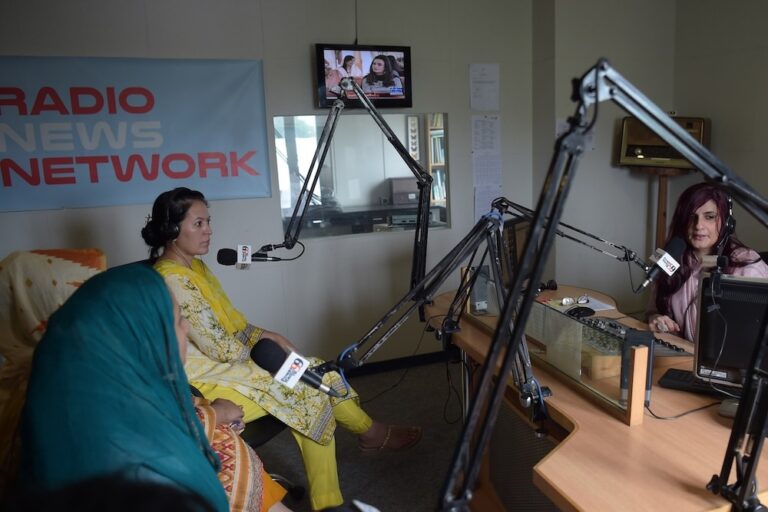January 2021 in Asia-Pacific: A free expression roundup produced by IFEX's regional editor Mong Palatino, based on IFEX member reports and news from the region.
Positive developments in the region such as prison releases and the outlawing of the “virginity test” were overshadowed by mass arrests in Hong Kong, an absurdly long prison term handed out to a Thai elderly woman for “insulting” the king, the silencing of journalists in Vietnam ahead of the Communist Party Congress, and the shocking acquittal of American journalist Daniel Pearl’s murderer in Pakistan. Is this trend a portent of things to come for the rest of the year?
Developing story…
On 1 February, Myanmar’s military launched a coup by declaring a state of emergency and arresting key government leaders and parliament members. Internet and communication lines have been disrupted in the capital. The army has been claiming that the November 2020 elections were rigged, and accused the ruling National League for Democracy of ignoring its appeal to investigate the alleged voting irregularities. You can check @MizzimaNews for updates on this emerging story.
Mass arrests in Hong Kong
Police arrested 53 pro-democracy activists, including opposition leaders and lawyers, on 6 January on charges of violating the National Security Law. Authorities said those arrested committed subversion for participating in an election primary last July since their objective was to select candidates in the Legislative Council election and block a government budget bill. Over 600,000 Hongkongers cast their votes in the July 2020 primaries while the election was subsequently postponed because of the pandemic.
“These arrests mark the most brazen attack to date on the rights and freedoms of Hong Kongers,” said Michael J. Abramowitz, president of Freedom House.
Several media outlets such as Apple Daily News, Stand News and inmediahk were ordered to submit documents and other information related to police investigations about the case. IFEX member the Hong Kong Journalists Association said this poses a threat to journalists and contributes to a chilling effect and self-censorship.
“Distorted information” – Vietnam convicts journalists
Several independent journalists received long prison sentences for the charge of publishing “distorted information about the people’s government” ahead of Vietnam’s Communist Party Congress. Three members of the Independent Journalists Association of Vietnam – Pham Chi Dung, Nguyen Tuong Thuy, and Le Huu Minh Tuan – were found guilty on 5 January and sentenced to more than 10 years in prison. Meanwhile, Facebook user Dinh Thi Thu Thuy was convicted on 20 January and sentenced to seven years in prison for criticizing the government’s health and environment policies.
As of December 2020, the Committee to Protect Journalists (CPJ) has documented at least 15 Vietnamese journalists behind bars.
43 years in prison for sharing audio clips about the Thai king
A 63-year-old Thai woman was sentenced to 87 years in prison for sharing audio clips deemed insulting to the monarchy. The prison term was reduced to 43 years and six months after the defendant pleaded guilty to the charge of violating section 112 of the Criminal Code or Lèse-majesté (anti-Royal Insult law). Despite the penalty adjustment, it is still the longest prison sentence handed out to a person convicted of disrespecting the monarchy. Since the COVID-19 outbreak, the government has used emergency decree measures and the Lèse-majesté law to threaten activists with arrest for organizing protests. As of 19 January, at least 54 people had been charged or summoned by the police to hear Lèse-majesté charges. Recently, a Lèse-majesté complaint was filed against an opposition leader for questioning the government’s COVID-19 vaccination program.
Malaysia’s state of emergency, a threat to democracy?
Malaysia’s declaration of a state of emergency in response to the surging COVID-19 cases in the country is being described by various human rights groups and the opposition as a threat to democracy. The emergency measure imposed not just restrictions on movement but also a ban on political activities. Parliamentary sessions have been suspended and elections are prohibited. The armed forces have also been provided with police powers to enforce the law. IFEX member the Centre for Independent Journalism (CIJ-Malaysia) lambasted the threat of authorities to arrest social media users and citizens who interfere with the implementation of the emergency measures:
“Why such an immediate impulse to silence critics? This foretells a possibility that this emergency is likely to be used to justify arbitrary arrests and investigations that infringe on freedom of expression and other fundamental liberties. This also shows the possibilities of heightened military presence and attempts to further curtail our liberties, which must not be undermined during a public health crisis, and especially not under the guise of an emergency.”
Farmers’ protests in India
Since September, millions have mobilized and expressed support to Indian farmers who have been calling for the repeal of new agricultural laws that they claim will remove government subsidies to the sector. Farmers accused the government of abandoning the fate of the rural industry to the mercy of big businesses while authorities insist that the new laws will spur investment and boost farming outputs.
Protest camps were set up near the capital and thousands of people have gathered there. A tractor protest march dismantled the barricades erected by the police and led to violent clashes on 26 January, India’s Republic Day.
The protesters have returned to the camps, and continue to demand the repeal of the new farm laws.
Good news
Bangladeshi photojournalist Shafiqul Islam Kajol was released from jail on 25 December after being granted bail in three Digital Security Act cases filed against him. His release came after two months of disappearance and seven months in detention for his critical posts on Facebook. PEN America calls for an end to the “thinly veiled attempts to silence an outspoken critical voice” and the dropping of charges against the journalist.
The International Federation of Journalists welcomed a conviction announced on 18 January as “a long awaited step in achieving justice after an extended period of impunity.” Five men were sentenced to life imprisonment for the murder of Bangladeshi journalist Humayun Kabir Balu, who was killed in a targeted explosion in Khulna in 2004. He was the editor of Dainik Janmabhumi and a former president of the Khulna Press Club.
Justice Ayesha A Malik of the Lahore High Court in Pakistan has banned the use of the “two-finger test” for victims of sexual violence. IFEX member the Digital Rights Foundation called the court decision a “monumental judgement in the arena of women’s rights in Pakistan.”
Tibetan language rights advocate Tashi Wangchuk, who had been serving a five-year sentence for “inciting separatism” in connection with his advocacy, has been released from detention. Despite this, Tashi is still subject to a five-year deprivation of political rights and will remain under government surveillance.
In brief
In Afghanistan, more than a dozen people led by a cleric stormed the local Zohra radio station in Northeastern Kunduz province on 15 January, vandalizing the office and breaking most of the equipment. IFEX member The Afghanistan Journalists Center has condemned the incident: “This shocking attack on Zohra radio station comes at a time when the targeted killing of journalists already posed serious challenges for press freedom, and cannot go unpunished.”
In the Philippines, a third cyberlibel charge has been filed against Filipino-American journalist Maria Ressa, the founder of news portal Rappler. The #HoldTheLine Coalition has condemned it as yet another politically-motivated charge:
“This state-enabled harassment campaign serves one purpose: to silence critical journalism aimed at holding power to account and exposing corruption.”
Pakistan’s Supreme Court has ordered the release of Ahmed Omar Saeed Sheikh, the mastermind of US journalist Daniel Pearl’s abduction and murder in 2002. The court also ordered the release of three of Sheikh’s accomplices – Salman Saquib, Fahad Nasim and Sheikh Adil. Reporters Without Borders described the ruling as an “extremely shocking denial of justice for the Pearl family and for all journalists working in Pakistan.” It added:
“This acquittal will remain as a symbol of the absolute impunity surrounding crimes of violence against journalists in this country.”
IFEX member Bytes for All has partnered with other civil society organizations in launching an online campaign themed #IDontForwardHate “to push back the menace of hate and incitement to violence.” It enjoins the public and netizens to pledge to root out hatred, extremism, sectarianism and intolerance from Pakistani society.



